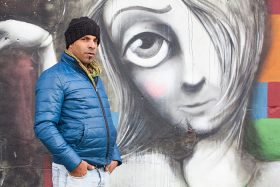Readers of our blog may be interested to learn that from 5 May to 3 September, the Museum in the Kulturbrauerei is hosting the exhibition Shalom. 3 Photographers Look at Germany. Holger Biermann | Rafael Herlich | Benyamin Reich. Here is a snippet from the exhibition announcement:
A kosher food store in Berlin, a rabbi’s family with a new-born, police officers standing guard at a Frankfurt synagogue – scenes from everyday Jewish life in Germany. These photographs by Holger Biermann, Rafael Herlich and Benyamin Reich from 2000 to 2015 document Jewish life and culture from different perspectives – not only showing children in a Talmud School or practicing Jews celebrating Rosh Hashanah, the Jewish New Year, but also anti- Semitic graffiti daubed on a synagogue.
The exhibition encourages visitors to engage with the question: How far is Jewish life taken for granted as a normal part of German society 70 years after the Shoah?
Opening times: Tues-Sun 10 am–6 pm, Thurs 10 am–8 pm
Free admission
More information, on supplementary offerings for example, can be found on the website of the Museum in the Kulturbrauerei (in German).
A Conversation with Karamba Diaby

Karamba Diaby; photo: Michael Bader
The first black man in the German Parliament — that’s often how Karamba Diaby is introduced. In his book Mit Karamba in den Bundestag: Mein Weg vom Senegal ins deutsche Parlament (With Karamba to the Bundestag: My Journey from Senegal to the German Parliament) Diaby provides fascinating insight into his life, a story of many toppled prejudices.
On June 1, 2017 he will introduce his book as part of our series “New German Stories” and discuss his journey from Senegal to East Germany, his experiences after German reunification, casual racism, and not least the goals and visions he holds as a Member of Parliament. Sithara Weeratunga and Serpil Polat asked Karamba Diaby three questions in anticipation of the event: → continue reading
Three Question for Anthropologists Dr. Dani Kranz and Katja Harbi

Photo: Katja Harbi
Our Academy programs regularly introduce new scholarship examining contemporary issues of migration and diversity. On May 4, University of Wuppertal anthropologists Dr. Dani Kranz and Katja Harbi will be presenting the results of the study they conducted, entitled Israeli Migration to Germany since 1990, with a lecture and show of photographs at the Jewish Museum Berlin. The research was largely about these immigrants’ identities and the significance of the Shoah for their lives in Germany, as well as the political and ideological debates occurring around them in Israel and Germany. We put three questions to the two anthropologists in advance of their presentation: → continue reading

